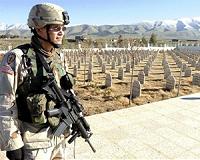| . |  |
. |
London (AFP) Aug 23, 2010 Foreign investors are still put off by violence in Iraq but most companies believe the security situation will improve, despite the withdrawal of international troops, a new study found Monday. A survey of more than 300 senior executives by the Economist Intelligence Unit (EIU) found that seven years after the US-led invasion that toppled Saddam Hussein, 64 percent thought it was still too dangerous to do business in Iraq. But there was optimism about the future, according to provisional results seen by AFP, with 55 percent saying they believed the security situation for foreign executives and employees would improve over the next two years. This is despite the withdrawal of foreign troops from the country -- Britain pulled out its combat soldiers last year, while the United States withdrew its last combat brigade last week, although 50,000 troops will remain. According to the EIU survey, which will be published next month, violence was the biggest business risk for 67 percent of respondents, followed by corruption (44 percent) and the lack of infrastructure (35 percent). Iraq's oil and gas reserves were the most attractive aspect of the country for investors, but after this, 43 percent said construction and real estate was the most promising non-hydrocarbon sector, followed by consumer goods (23 percent) and healthcare and pharmaceuticals (18 percent). The EIU surveyed 367 senior executives from 52 countries about their perceptions of investment in Iraq. They work for 80 companies currently investing in Iraq and 32 companies that are considering it.
earlier related report In a speech to veterans, Biden played down Iran's role in Iraq, defended the scaled-back US mission in Iraq and argued that the country was on the road to political stability. "Iranian influence in Iraq is minimal. It's been greatly exaggerated," Biden told the Veterans of Foreign Wars in Indianapolis, Indiana. "The Iranian government spent over 100 million dollars trying to affect the outcome of this last election to sway the Iraqi people, and they utterly failed," he said, referring to the March polls. "And it's because politics and nationalism has broken out in Iraq. The Iraqi people voted for their desired candidates, none of whom, none of whom -- let me emphasize this -- none of whom were wanted by Iran." Biden said that Iraqi Prime Minister Nuri al-Maliki and his rival for the premiership, Iyad Allawi, were both deemed "persona non grata" by the authorities in neighboring Iran. US officials and some lawmakers in Congress have previously voiced concern about Iran's role in Iraq. Biden also offered an optimistic view on the aftermath of Iraq's inconclusive March 7 general election, even though political leaders so far have failed to form a new government amid disputes over power-sharing. He said he was optimistic about the outcome of the negotiations in Baghdad. "This process can sometimes be frustrating and there are ups and downs, but I'm here to tell you I'm absolutely confident that Iraq will form a national unity government that will be able to sustain that country," he said. He said that he had urged party leaders to forge an accord and "made it clear to the leading politicians that it's time for them to match the courage of their citizens by completing this process." Responding to critics who have warned against the US troop withdrawal, Biden said that violence was at lower levels compared to four or five years ago. "Some said that our drawdown would bring about more violence. Well, they were wrong, because the Iraqis are ready to take charge," he said. Al-Qaeda's network in Iraq and Shiite militants still posed a threat, "but they have utterly failed to achieve their objective, which was to inflame an additional round of sectarian conflict and undermine the election that just took place and stop the formation of a new government. "They have failed," he said. The last US combat brigade pulled out of Iraq last week, as the US military reduces troop levels to 50,000 by September 1 under a new "advise and assist" mission laid out by President Barack Obama. Obama, who opposed the Iraq war from the beginning and promised as a candidate to withdraw US forces as quickly as possible, has insisted the drawdown is on schedule and will not be altered.
Share This Article With Planet Earth
Related Links Iraq: The first technology war of the 21st century
 U.S. Withdrawal From Iraq: Ending Or Outsourcing The War?
U.S. Withdrawal From Iraq: Ending Or Outsourcing The War?Moscow, Russia (RIA Novosti) Aug 20, 2010 Iraqis, along with the rest of the Muslim world, have ushered in the holy month of Ramadan, hoping it will give their thoughts some refuge from worries about Iraq's future. The country is still living without a cabinet, and only God knows when it will get one. Meanwhile, the U.S. has started withdrawing combat brigades in keeping with President Barack Obama's election pledge. All combat tr ... read more |
|
| The content herein, unless otherwise known to be public domain, are Copyright 1995-2010 - SpaceDaily. AFP and UPI Wire Stories are copyright Agence France-Presse and United Press International. ESA Portal Reports are copyright European Space Agency. All NASA sourced material is public domain. Additional copyrights may apply in whole or part to other bona fide parties. Advertising does not imply endorsement,agreement or approval of any opinions, statements or information provided by SpaceDaily on any Web page published or hosted by SpaceDaily. Privacy Statement |